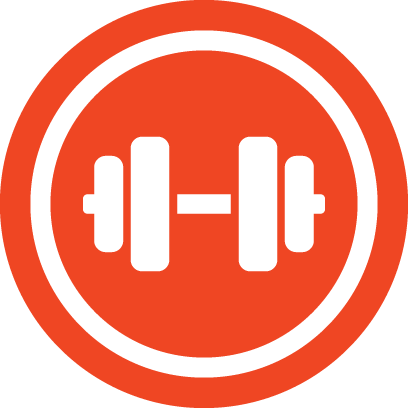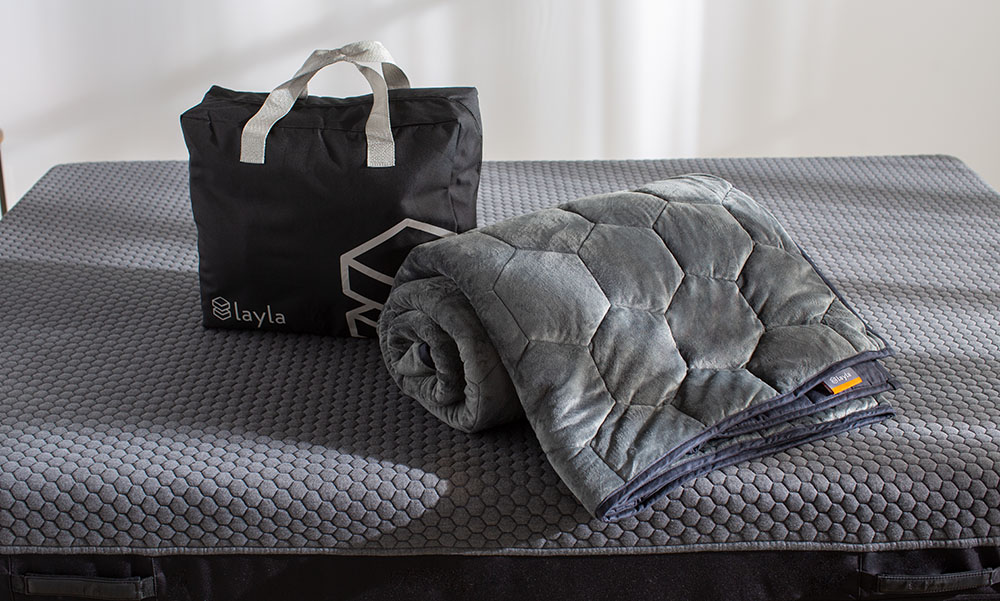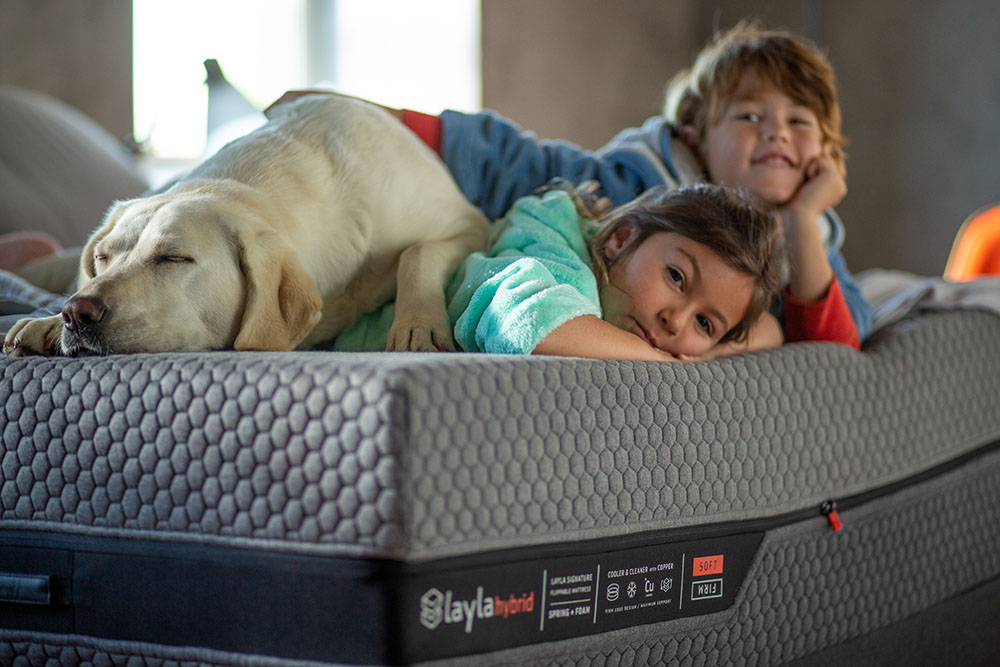Working out results in microtears in your muscles, which need time to properly repair before you go into your next workout. Luckily, there are many methods you can use to speed up your recovery. One way is as easy as tucking yourself into bed. Sounds too easy, right?
Well, it turns out that getting under just any old covers won’t do – you’ll have to tuck yourself under a weighted blanket. Research has shown promising results for athletes who use weighted blankets for sore muscles. Keep reading to learn more about how these specialized blankets can help you on your fitness journey.

Why is Recovery Important?
Before we dive into how weighted blankets help you recover better, it’s important to understand why you should care about recovery in the first place.
If you exercise regularly or you’re in the “athlete” category, you might question why you need to slow down at all. Although “no pain, no gain” is a constant refrain in the fitness world, it doesn’t mean you should push your body to its limits every time you work out. Resting properly is an integral part of any training regimen. Working out breaks your muscles down and recovery is where your true muscle and strength gains occur.
A proper recovery involves sleep, stretching, and the right nutrition. Compression can also be part of your recovery – which is where weighted blankets come in. Using weighted blankets for muscle recovery provides your body with compression and can help send you into a deeper, more restful sleep.
What is a Weighted Blanket?
If you haven’t heard about them yet, a weighted blanket – sometimes called a gravity blanket – is a blanket filled with a heavy material like sand, glass beads, or plastic pellets. Blankets range from very lightweight to up to 30 pounds. If you need help choosing a weight for your weighted blanket, you can read our guide to learn more.
Layla’s Weighted Blanket is actually customized based on your bed size and provides two sides of softness. One on side, you’ll enjoy a smooth, cozy cotton surface. The other side boasts a mink-like faux fur material for those days where you want a little extra plushness. Filled with glass beads, it evenly distributes weight that feels like a warm, comforting hug – and that’s why athletes may want to consider investing in a weighted blanket for sore muscles.
Just as a hug can provide an emotional connection, a hug from your weighted blanket can provide your body with physical pressure that alleviates pain and stress.
How Do Weighted Blankets Work?
Weighted blankets work by mimicking deep pressure therapy or deep pressure stimulation, which provides individuals with a gentle squeezing sensation that helps relax the nervous system. When it’s done properly, deep touch pressure therapy can trigger an overall sense of calm.
When used regularly, weighted blankets may have similar effects to this therapeutic technique and may improve sleep, decrease overall anxiety, and decrease stress.

Compression and Muscle Recovery
Compression is a tool many athletes already use for recovery. You’ve probably heard of RICE, Rest Ice Compress Elevate, which is a method used to promote healing after injury. But you can use compression for more than just injuries like sprained ankles or strains. In fact, one study found a significant positive effect from the use of compression tights on exercise-induced muscle damage. The study further recommended that athletes wear compression tights immediately for 24 hours after exercise. So, why does compression help?
Compression increases blood circulation, which means that waste from your muscles is flushed out and new blood is cycled in. When your limbs are compressed, your veins get smaller, forcing blood to flow to your heart where it will be reoxygenated. Then, that oxygenated blood is pushed back to your muscles to help heal them more quickly.
Weighted Blankets and Muscle Recovery
Besides just calming you down and providing you with a pleasant serotonin boost, weighted blankets also provide a form of compression. A weighted blanket adds bulk and mass onto your body, which can mirror the effects of compression. In turn, the swelling and inflammation that rears its ugly head after a tough workout might just simmer down more quickly with a little help from your friend, the weighted blanket.
Although these blankets may provide a compression benefit, it provides another equally valuable perk when it comes to your sleep. Because weighted blankets provide a calming effect, they can help you fall asleep and help keep you asleep, too. If you’re prone to anxious thoughts or sensory issues like Restless Legs Syndrome (RLS) that tend to negatively impact your sleep, weighted blankets can help ameliorate these issues.

Sleep is one of the most important parts of helping your body rest and restore itself if you’re feeling sore and stiff post-exercise. Although nutrition provides your body with immediate help to replenish glycogen stores and sends protein to your muscles, sleep helps quicken your long-term recovery process.
In fact, sleep deprivation increases cortisol, a stress hormone that can have an inflammatory response in your body and impede recovery. Failing to sleep enough can also decrease the production of glycogen and carbs that are stored to be used for physical activity. Less sleep means that you increase the likelihood of feeling tired, experiencing lower energy levels, and having less focus during your next workout. Your body might also be more sluggish during its recovery period.
With adequate sleep, you can feel more refreshed and back to your old self more quickly. If you have undergone a particularly tough workout or are going through a few weeks of increased volume or intensity in preparation for a race or an event, you may want to consider increasing the hours you sleep. 7-8 hours is still a great goal, but consider trying to sleep for an additional hour when your body is under more stress.
And if you feel sleepy during the day after training hard, there’s evidence that napping can help boost performance and mental alertness. Just make sure you keep your nap short and sweet so that it won’t affect your ability to sleep at night.
What are the Signs of Overtraining?
If you’re an athlete worried about overtraining, there are some telltale signs to watch out for. In some cases, overtraining can cause an injury that no amount of time under a weighted blanket can heal. It’s important to listen to your body and use reasonable training methods to guide your workouts.

Here are some signs you need to pull back from your training intensity or volume (or both!):
- You’re not hungry. When you work out, you expend calories that need to be replaced. If you’re losing your appetite after training, it’s time to take it easy.
- You’re having trouble sleeping. If you feel like you can’t let go of the tension from the workout and you’re having a hard time sleeping, your training may be impacting your body’s ability to fully relax and decompress.
- You’re experiencing extreme muscle soreness: Moving around gingerly the next day after a workout is common, but if you’re really struggling to get around, you probably pushed yourself too far.
- Overuse injuries. Ideally, you don’t ever get to this point. But sprains and strains are common overuse injuries that might set your training back months as you wait for your injury to heal. This is a sign you need a complete makeover for your training regimen.
- Decline in performance. Feeling weak or slow during your workout? Give yourself an extra day or two of recovery.
- Grumpiness. Overtraining may lead to a change in your stress hormone levels (cortisol). In turn, you might go through a period of moodiness and a loss of concentration. If you’re feeling blue, your training might be impacting you.
Conclusion: Recovering the Right Way with a Weighted Blanket for Sore Muscles
Although a Layla weighted blanket alone won’t turn you into an Olympic athlete, it can still provide tons of benefits. If you’re active and you suffer from anxiety and stress, getting to sleep can be a serious issue. Luckily, weighted blankets not only provide a compression-like pressure to help your muscles recover more efficiently, they also help promote calmness and can melt away stress. Using weighted blankets for sore muscles and muscle recovery can have the bonus effect of sending you into a relaxing, restorative sleep.



